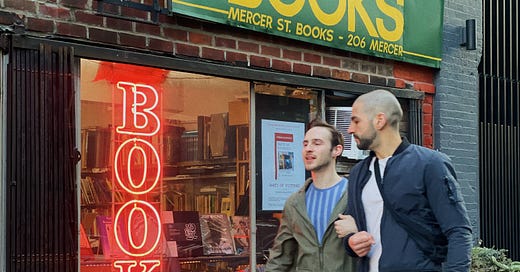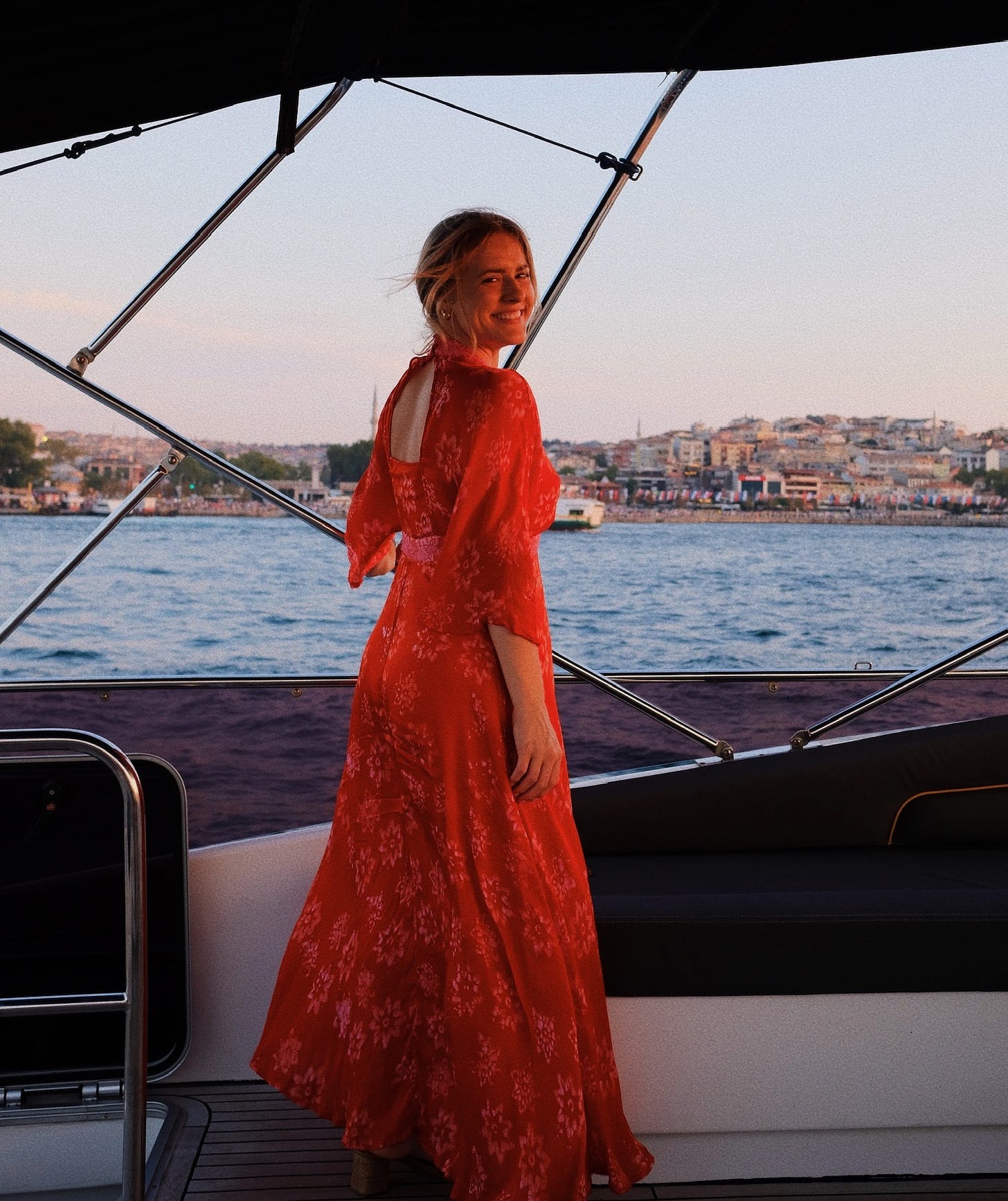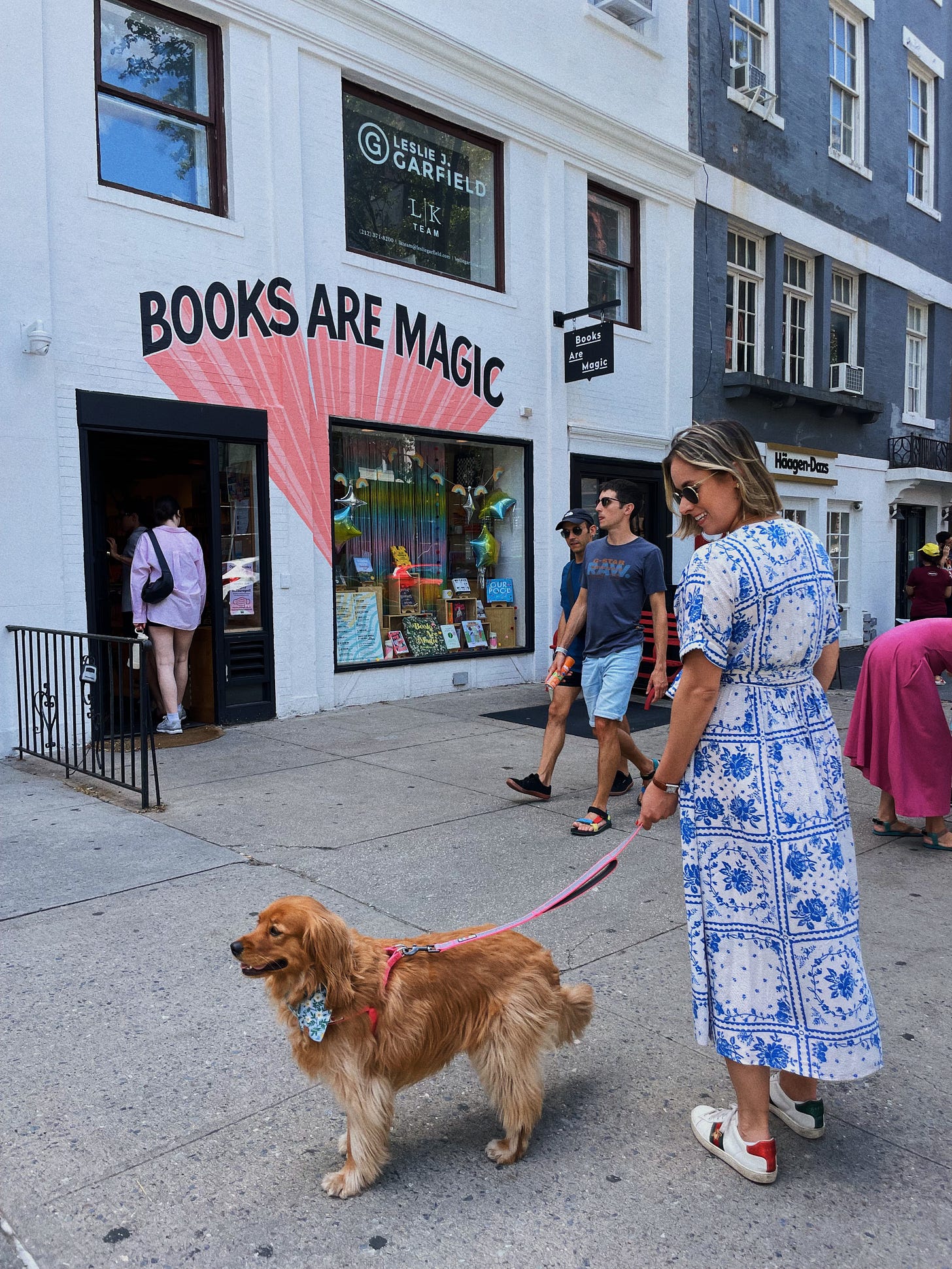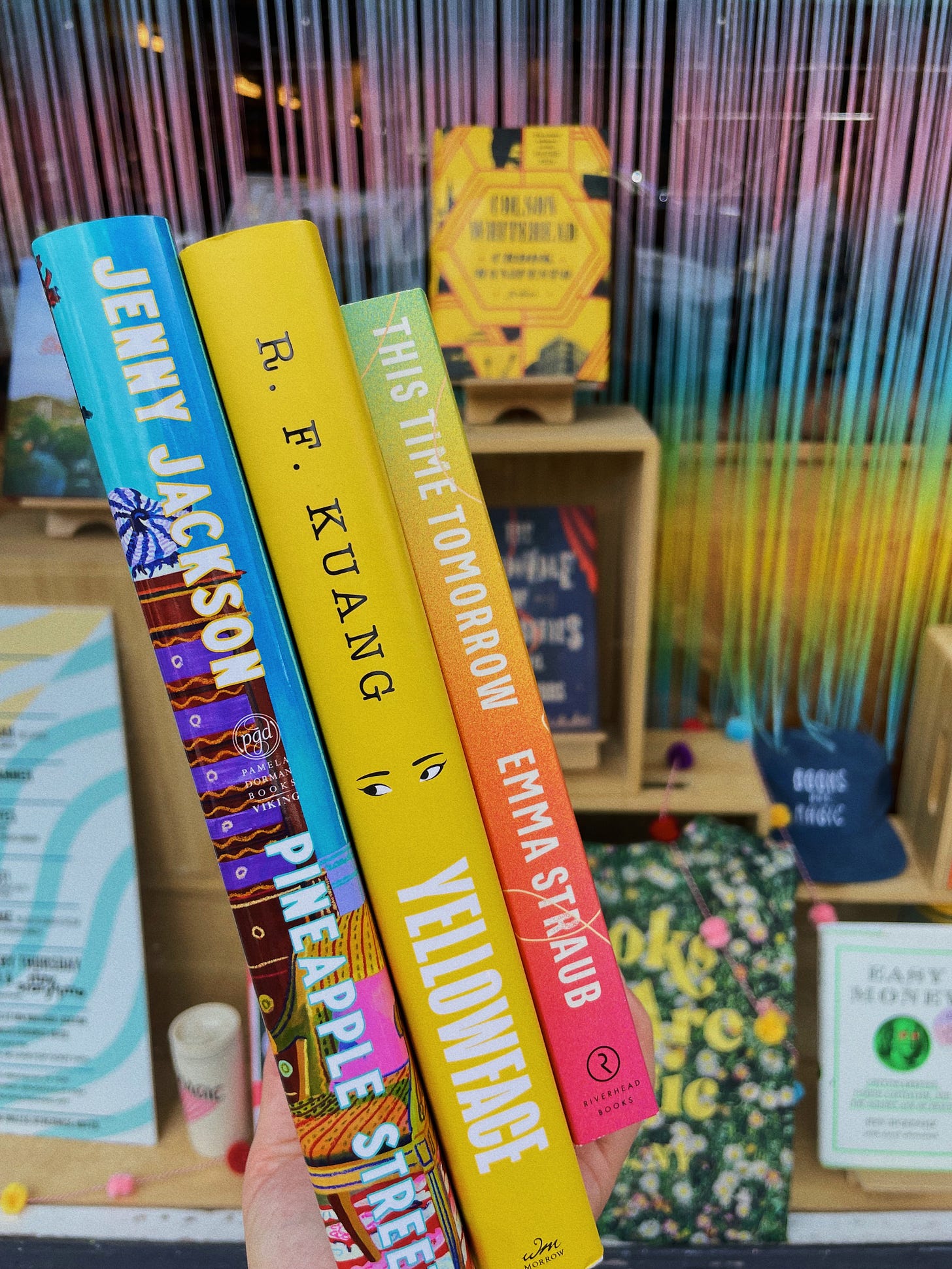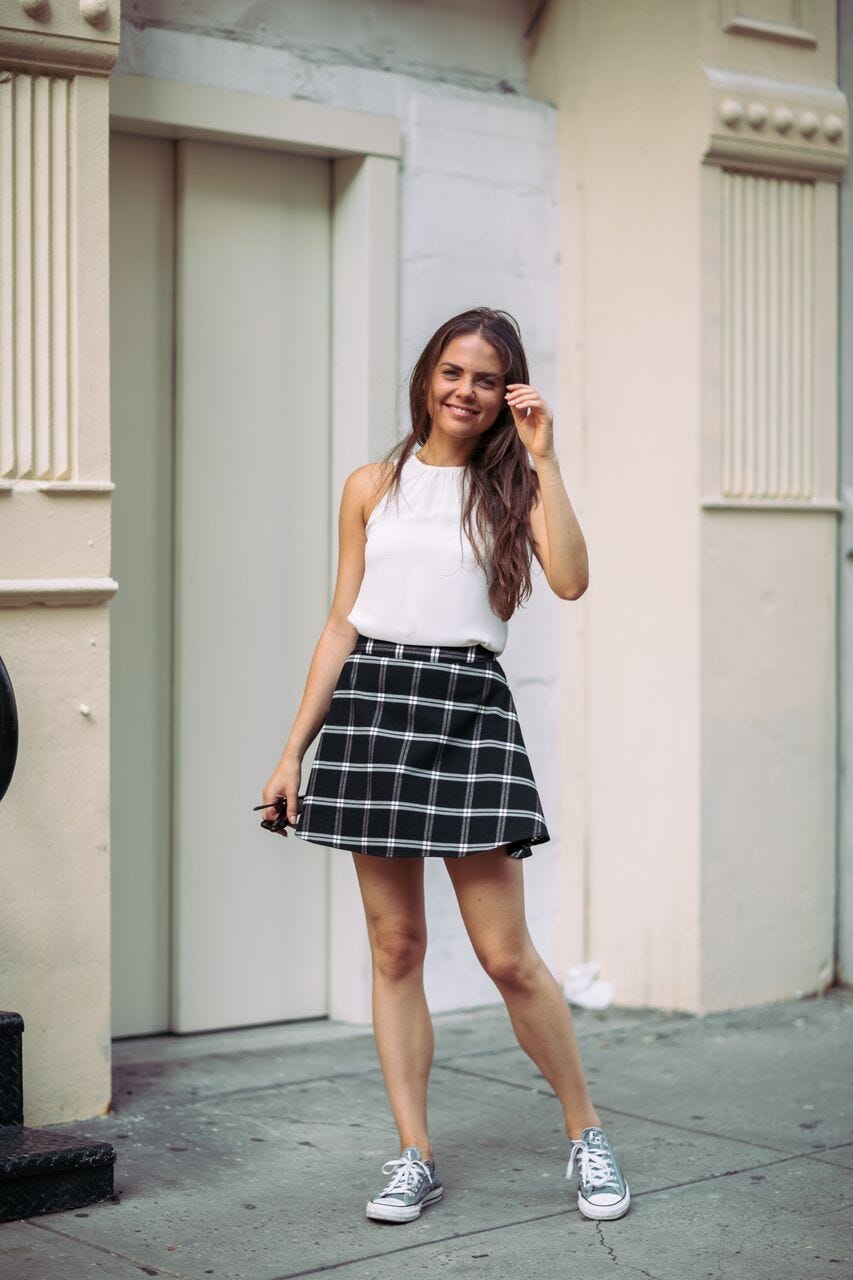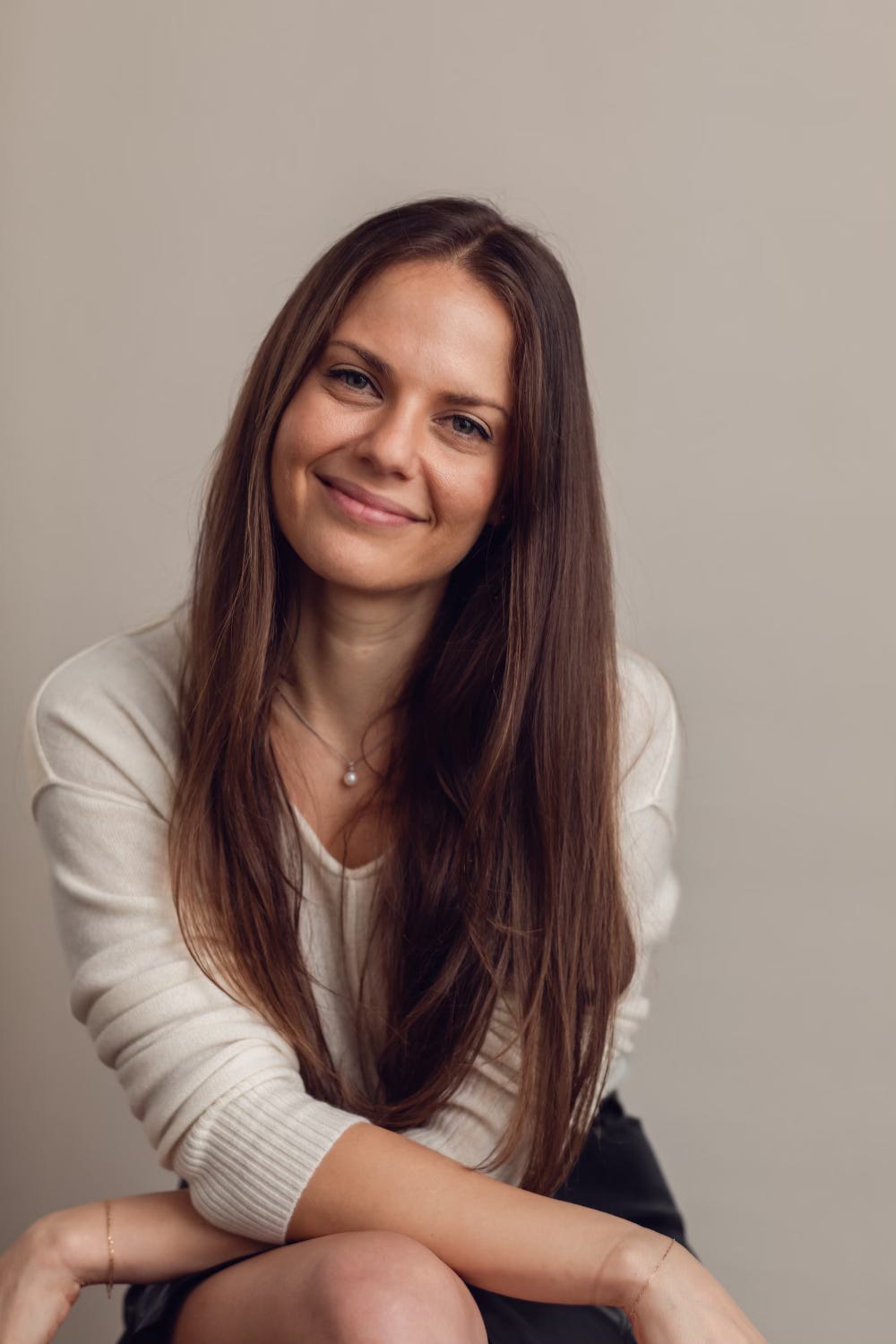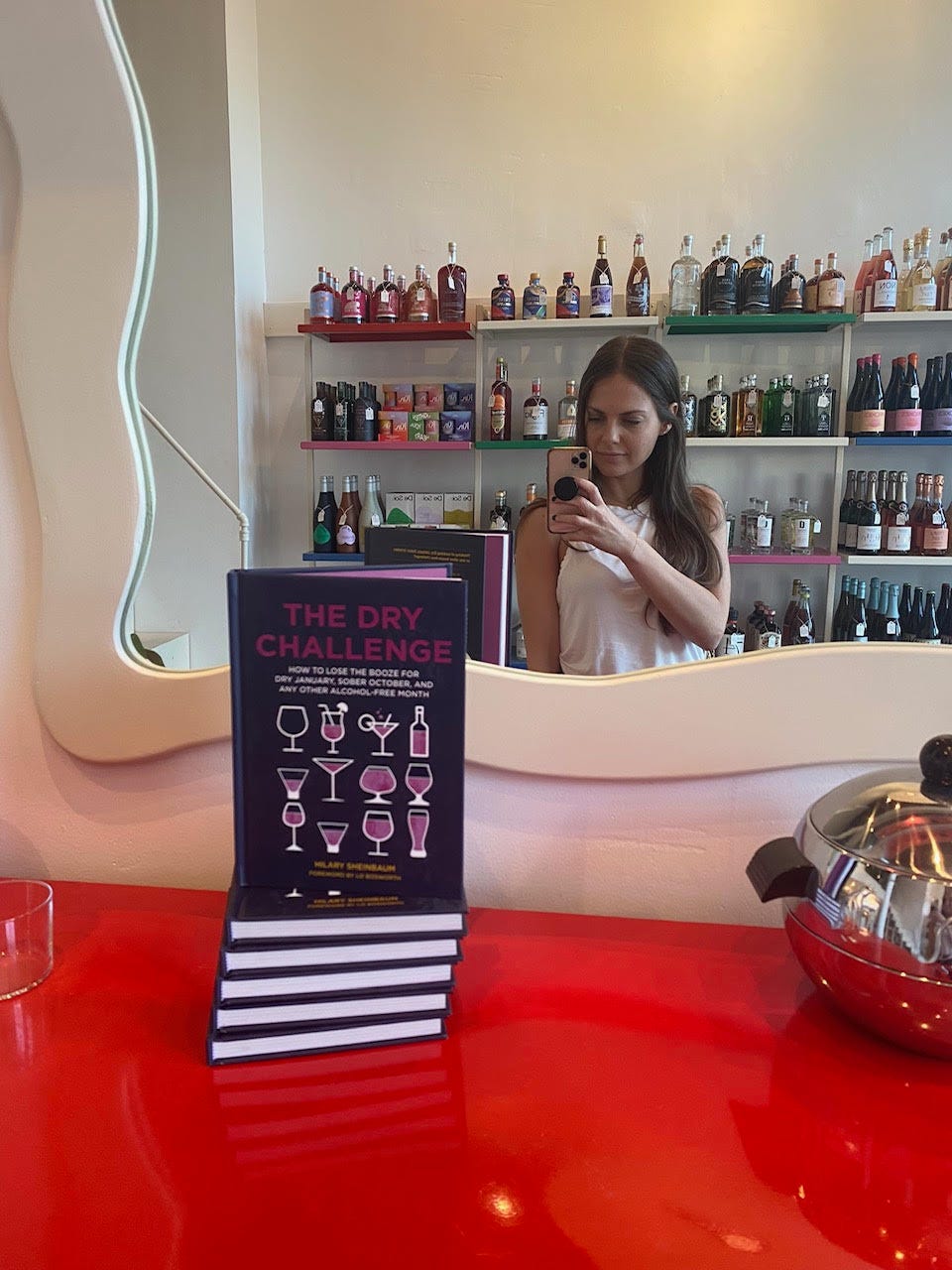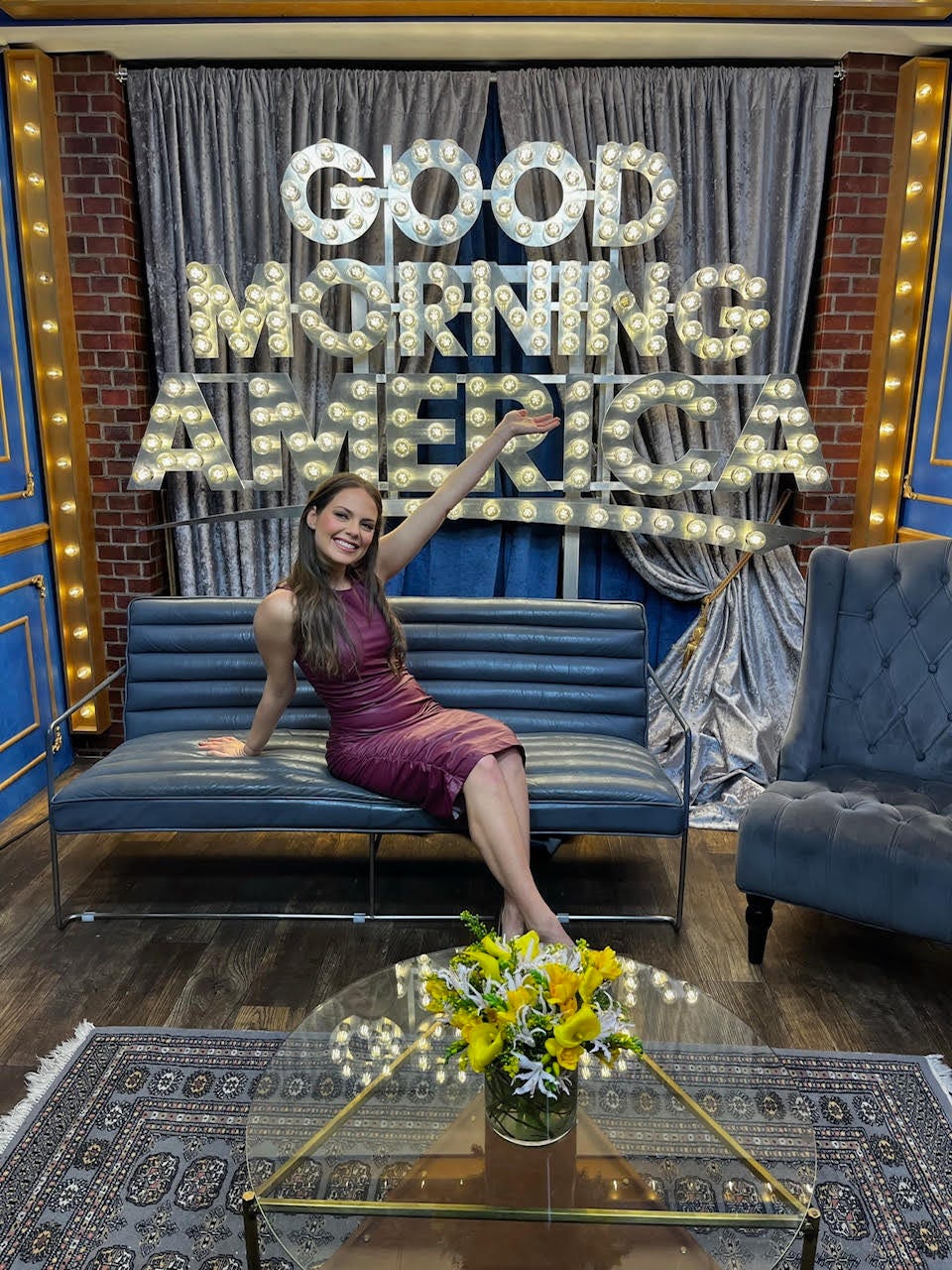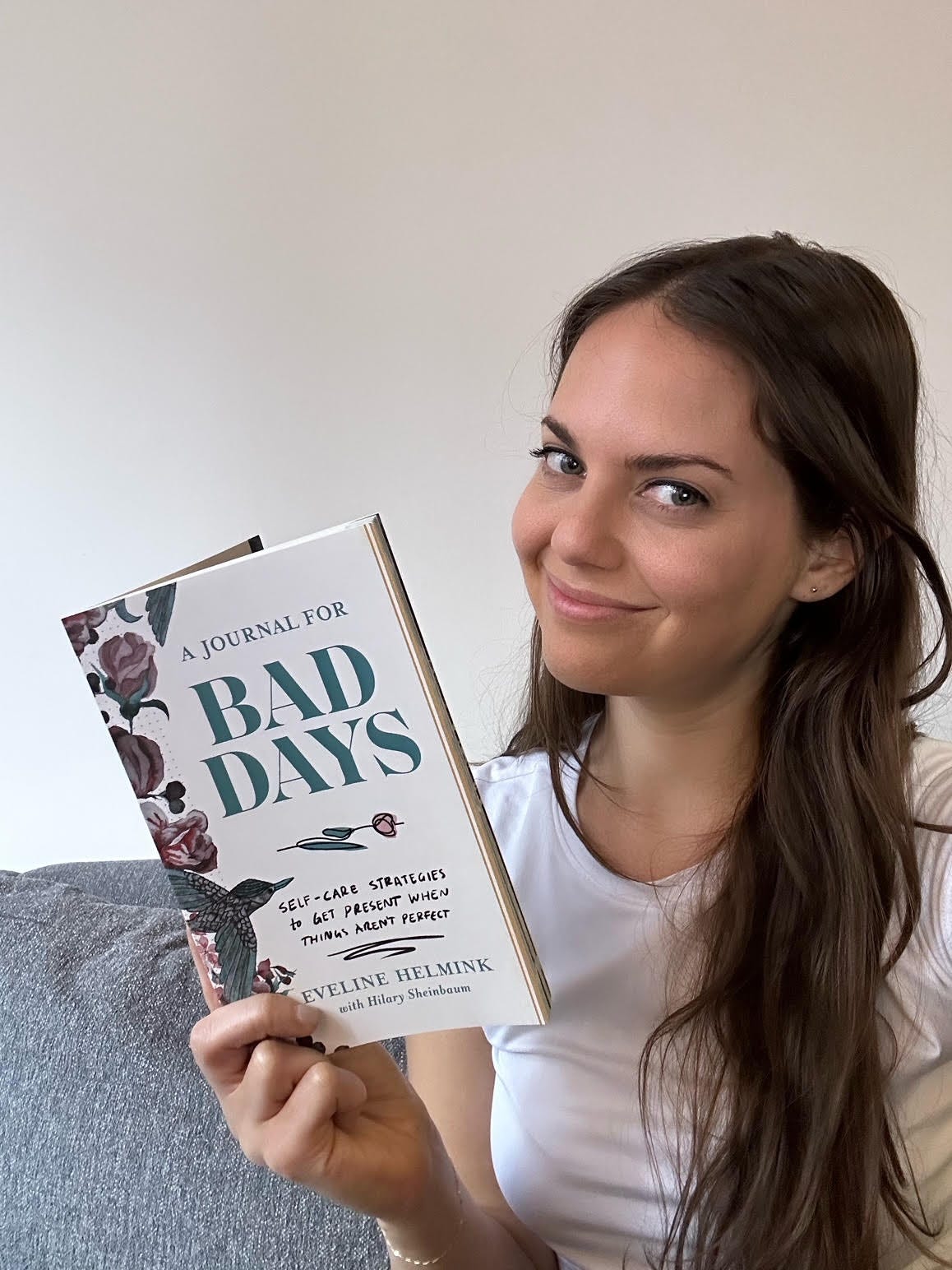
as we look back on the year, I’ll keep this intro short and sweet. I’m using this final send in 2023 to recap my favorite reads of the year, share the IN/OUT list, and introduce you Hilary Sheinbaum, a writer who offers a load of actionable advice around sobriety. if you, too, are planning on doing Dry January, I think you’ll get a lot out of our chat below. but first, let’s pretend we’re on a stroll to the bookstore as I was on this beautiful summer day with Laura and her pup, Cher…
my top eighteen books of 2023
in previous years, I’ve recapped my top five non-fiction and fiction reads, respectively. but this year, I’ve read more books than I have in years past (fifty-seven as of this morning, just shy of my goal of sixty!), so I extended my lists just slightly. in the non-fiction category, I’ve got fewer memoirs than usual, but a solid variety of reads spanning topics like emotional intelligence and naturally, hospitality.
in the fiction realm, I’ve narrowed my list to a dozen reads that stuck with me. I’ve got a classic on the list (Gone Girl) and some of 2023’s hottest releases (Bright Young Women, The Five-Star Weekend, and Yellowface), as well as some fabulous debuts by authors who have been featured in the sunday series: Genevieve Wheeler (Adelaide), Becca Freeman (The Christmas Orphans Club), and Jenny Jackson (Pineapple Street).
my top six non-fiction reads of 2023
Anna: The Biography by Amy Odell
Atlas of the Heart by Brené Brown
Horse Barbie by Geena Rocero
From the Corner of the Oval by Beck Dorey-Stein
The Perfectionist’s Guide to Losing Control by Katherine Morgan Schafler
Unreasonable Hospitality by Will Guidara
my top twelve fiction reads of 2023
Adelaide by Genevieve Wheeler
Bright Young Women by Jessica Knoll
The Christmas Orphans Club by Becca Freeman
The Five-Star Weekend by Elin Hilderbrand
Gone Girl by Gillian Flynn
Love and Other Words by Christina Lauren
My Dark Vanessa by Kate Elizabeth Russell
The Nightingale by Kristin Hannah
Pineapple Street by Jenny Jackson
This Time Tomorrow by Emma Straub
Yellowface by R.F. Kuang
The Whispers by Ashley Audrain
IN/OUT list
as always, when going into a new month, I round up what I project to be IN/OUT. but, since we aren’t just going into a new month but a WHOLE NEW YEAR, I’ve extended the list to be a trend forecast for 2024. fittingly, I’ve got twenty-four items on each list!
“IN” IN 2024
your real life being bigger than your online life
the girls’ trip making it out of the group chat
being confident on the dance floor
your dance floor confidence wearing off on me
red lip on a tuesday
making an ebay/poshmark offer
eating red meat (rare)
using your library card
restaurant merch
candles burning in the bathroom (applicable to restaurants and at home)
fresh mint tea nightcaps, whether you’re sober curious or not
spectating the Olympics
hosting dinner parties instead of making big group ressies
having a bunny as a pet (even though I’m allergic)
your comfort re-watch show being dark and twisty
exercising your right to vote
being bad at your hobby
men who are on Goodreads
solo movie theater dates
carrying a nail file at all times
being a patron of the arts
peach mango lyte Bodyarmor (my vice)
getting butterflies
butterflies in general 🦋
“OUT” IN 2024
being scared of being seen trying
crispy eyebrows
social media making you feel behind on a socially constructed timeline
inflation 🤝 lifestyle creep = a wicked combination
athleisure—idk, I just don’t want to buy another pair of Lulu leggings
TikTok restaurants (the likes of Bad Roman with menu items made for taking videos)
waiting for a special occasion
speakerphone in public
dog people thinking they are superior to cat people
there not being a Homegoods below 99th St
waiting till the last minute to book flights (this is from me, to me)
chunky wineglasses—I want them so delicate I could break them by just looking
being anxious about not knowing what’s next
when you say EXpresso to me
being the only person in your family in therapy
always needing three things at Sephora
subbing brown rice for white rice
the hot girl hampster wheel
trauma bonding
"sorry, we only have Tabasco"
being paralyzed to post
trying to cram too much into one trip
always being amenable, even when it bends your boundaries
not knowing what your boundaries are to begin with
meet Hilary Sheinbaum
if you’re feeling anything like me at the the close a gluttonous holiday season, the prospect of tightening things up in january holds an immense allure. at the center of so much of my own personal (sometimes fraught) health journey lies the conundrum when and how to abstain from alcohol. when pondering what this could look like in the months ahead, immediately, I thought of Hilary Sheinbaum’s book, The Dry Challenge: How to Lose the Booze for Dry January, Sober October, and Any Other Alcohol-Free Month. I’m thrilled to be spotlighting her story and expertise in the final sunday series of 2023!
Kayla Douglas: Hilary, can you tell us about your journey towards becoming a freelance writer and published author?
Hilary Sheinbaum: Ever since middle school, I wanted to write a book. To be completely honest, I never thought it would be about abstaining from alcohol—more on that later. In high school, I became interested in journalism and specifically wanted to be an entertainment writer or a magazine editor. Writing has always been something I enjoyed and did well, and my dream was to be the editor-in-chief of People Magazine or Teen People (RIP). I graduated from The University of Florida as a Public Relations major and ultimately moved to New York City and landed a job in public relations. My PR career was short-lived, though. I knew pretty quickly it wasn’t for me. I quit my job and decided to pursue freelance writing, as I was applying for full-time writer and editor roles—but by the time I was offered a job, I had already had a few writing gigs to sustain me, and I loved writing about so many different topics as a freelancer. Now, it’s been more than a decade.
For years, as a freelancer, I served as a red carpet reporter for the weekly gossip magazines Life & Style and In Touch—interviewing stars on red carpets, attending VIP/celebrity events, and going to exclusive after-parties. During the day, I would write about food and beverage; much of that coverage was related to alcohol. In December 2016, I had dinner with a guy friend while working an average of four or five red carpets or parties a week. We talked about the upcoming New Year and our resolutions (which I didn’t believe in—so I had none). The topic of “Dry January,” the act of giving up alcohol for 31 days, was brought up, and I changed the subject because it didn’t exactly vibe with my job or my lifestyle at the time. A week later, on New Year’s Eve, I proposed a Dry January bet to my friend over text, and he agreed. My friend lost our dry bet. I won, and I learned so much about how alcohol was impacting my days (and nights)! As nuts as it sounds, one silly wager changed the trajectory of my life. I ended up writing a non-judgmental book about how to give up alcohol for one month—any month—and that’s how The Dry Challenge and my career as an author began.
KD: For those considering partaking in Dry January, what does your book, The Dry Challenge, help readers understand in their quest to abstain from alcohol?
HS: I hope readers will take away an understanding that they don’t need alcohol to live their best lives, have fun, date, or be social. More specifically, it can help readers analyze how drinking affects them on a daily basis. Before completing my first Dry January, I was a terrible sleeper, getting four or five hours per night. I thought I was naturally anxious (I am, but not that anxious). And when I gave up alcohol that first Dry January (for 31 days in 2017), those four to five hours of shut-eye became seven to eight hours of sleep. So, giving up alcohol for a month gave me better sleep, for one, and overall, a different perspective that I otherwise wouldn't have had or believed could exist.
KD: Which tactics have you successfully implemented in social settings to feel more comfortable without leaning on alcohol?
HS: I drink a lot of nonalcoholic beverages and love introducing new stuff to people. If I’m hosting a dinner or picking a restaurant, I always make sure that nonalcoholic beverages (N.A. wine, beer, cocktails) are available for attendees. It’s just more inclusive that way for everyone involved. There’s an app called BetterWithout that can help patrons find restaurants and bars with N.A. options (it’s also a great app to use while traveling). In terms of attending social functions in people’s homes, my host/ess gift is typically a nonalcoholic bottle of wine.
I bring Giesen Nonalcoholic Red in the cooler months (Giesen Nonalcoholic Sauvignon Blanc in the warmer months), Mionetto Alcohol Removed Sparkling Wine, and Freixenet Alcohol-Removed Rosé for celebrations, and if there's a make-your-own drink opportunity, I’m coming with Free Spirits Bourbon, FLUÉRE Spiced Cane (rum alternative) and Damrak Gin 0.0 bottles for mixing. And, for parties, Twisted Alchemy fresh pressed juices go a long way! I had them for a friend's birthday recently, and everyone loved them. Not to mention, Twisted Alchemy juices can be used for whatever you or your guests are drinking—whether it’s high, low, or no ABV!
KD: What do you recommend for those who anticipate easing back into moderate drinking after doing Dry January to keep in mind? What's the "secret" to balancing it all?
HS: I think it’s important to evaluate why you’re drinking when/if you return to imbibing and to keep in mind everything that you learned during your dry month and utilize that knowledge moving forward. Maybe there are nonalcoholic options you found along the way or ways in which you'd rather spend your time. If you do end up drinking again, it’s imperative to realize that your tolerance is going to be significantly different (read: lower) than it was before your dry stint (so let’s not go overboard!). I learned that lesson the hard way. Definitely eat, hydrate, and sip beverages slower than you think is a normal/reasonable speed. And always plan how you’ll safely get home before you go out.
Over the years, my alcohol consumption has steadily declined. I've read statistics that show that people who do dry months tend to drink less in the months that follow, and I am definitely part of that stat. In terms of life balance, I think it's really about listening to your body, knowing your goals, and evaluating your relationship with all kinds of stuff. Sometimes, we need a break from things that seem to be normal staples in our day-to-day lives. Challenging notions we've adopted and become accustomed to is perfectly okay!
KD: What was the most difficult part of bringing your debut book into the world? The most rewarding?
HS: The Dry Challenge launched on December 29, 2020, during a global pandemic. All of my book tour dreams, promotion ideas, and many other life plans were scrapped. It was a tough environment to launch a debut book, but there were a lot more serious deviations happening around the world.The most rewarding part of sharing my book with the world has been the positive feedback—and I don’t necessarily mean publicly, although I love reading nice things about my books!
In 2020, months before The Dry Challenge was out, I penned a personal essay for The New York Times, which shared my story about giving up alcohol when stuff started getting crazy in March 2020. I wrote about sheltering in place without booze, and it garnered a lot of feedback. A woman who I never met emailed me to tell me that she read my story and started crying while she was drunk in bed. When she read my article, she realized she needed to give up alcohol, not just for herself but to better the lives of her family: her husband and two kids. Six months later, she followed up with me to tell me that she had been sober ever since. I touch base with her once a year just to say hi and see how she’s doing. Last time we emailed, she was still sober and doing well.
KD: You're a full-time writer—many would envy this perceived flexibility, but there's also a great deal of self-discipline needed to go freelance. What advice do you have for someone who wants to work for themselves?
HS: First, save some money before you make any big life changes!!! Try to give yourself a little runway as insurance. Next, establishing a system and schedule that works for you is really important. Sometimes, that means working on weekends—I know, not what people want to hear!—so that I can take calls and meetings and attend events during the traditional work day. And it’s equally important to evolve with work and adjust that system throughout your career. This is more of a personal habit, but I write down my schedule in a physical agenda book. It really helps me see the full scope of my week and month. I also write a to-do list every morning before I get started on work or even workout.
KD: You recently worked on A Journal for Bad Days which provides tools to navigate tough times. What can we expect from the prompts inside this journal?
HS: Yes! The prompts dig deeper into ways to become more present when things are not super sunny in a realistic way that isn't overly flowery. The book explores topics ranging from sleep to ego to the benefits of crying. It allows an opportunity to process personal thoughts and experiences on paper, in your own words.
KD: Tell us about the most recent work of fiction that left you with a book hangover.
HS: This isn’t recent at all—like, at all. But I do like to revisit The Alchemist. If that makes me cliché, oh well! I think I still have a book hangover from the first time I read it in 2017. Needless to say, it’s still one of my favorites.
KD: What book is on your TBR that you're most excited to pick up?
HS: The Joy of Funerals by Alix Strauss. It was recently re-released for its 20th anniversary. It’s a novel divided by stories featuring nine different characters who are coping with loneliness and longing. These days, there is a lot of discussion about isolation and the loneliness epidemic, so it’s quite relevant.
KD: The Sunday Series was conceptualized as a love letter to my favorite day of the week. If we were with you in your home neighborhood on Sunday, where would you take us to spend the afternoon?
HS: I've lived in nearly every neighborhood in NYC—Upper East Side, Williamsburg, East Village, Chelsea, and four other zip codes in Manhattan. Now, I live in TriBeCa. Until November 5th, I was training for The New York City Marathon, so Sundays used to be my rest days (literally on the couch), following long runs on Saturdays. Now, on Sundays, I typically take a Core Power Yoga or Barry's class (both conveniently in TriBeCa), followed by a stop at Laughing Man on Duane Street. I’m really into Matcha these days, so it’s going to be a Matcha latte with oatmilk for me.
My friend Darla recently launched MAKE Matcha, so on weekdays, that’s my go-to. But, on weekends, I opt for a treat made outside my own kitchen. But I digress! After a much-needed shower from my sweaty workout, I'll get my nails done at Glosslab in TriBeCa. I'll end the afternoon thinking it's midnight because the sun sets before five pm. Around this time, I'll be thinking about making an easy dinner with my partner, but probably ordering food instead and popping open a Curious Elixirs nonalcoholic cocktail. I'm really into their "No. 8" at the moment. I'll usually FaceTime my grandparents after my early bird dinner. And yes, I'm going to be checking my email. Gotta wrap up any work I need to get done before Monday morning!


